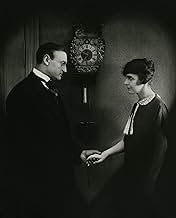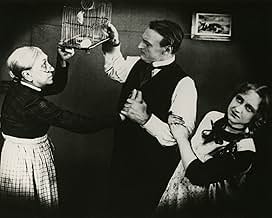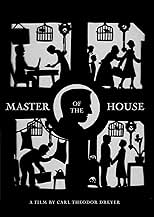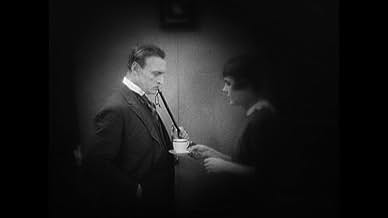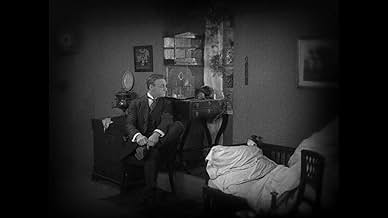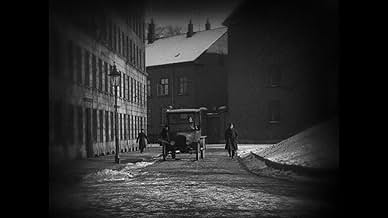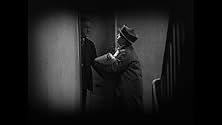CALIFICACIÓN DE IMDb
7.0/10
2.5 k
TU CALIFICACIÓN
Agrega una trama en tu idiomaWhen a man becomes tyrannical towards his family, the women of the house decide to teach him a lesson in gratitude.When a man becomes tyrannical towards his family, the women of the house decide to teach him a lesson in gratitude.When a man becomes tyrannical towards his family, the women of the house decide to teach him a lesson in gratitude.
- Dirección
- Guionistas
- Elenco
Opiniones destacadas
"We men are such fools!" proclaims former master of the house Viktor, and you can't help but feel a sliver of guilt as he silently utters those words. That's the timeless universality of film, I suppose: a Danish movie made over 80 years ago is still relevant today.
This was my first Dreyer, and it is quite a light offering considering the man's weighty reputation. It's a social drama with a patently feminist message delivered with a typically heavy hand (by today's standards). Johannes Meyer is Viktor, the decent man turned into a brute by the failure of his business who doesn't realise just how much he takes his long-suffering wife Ida (Astrid Holm) for granted. Fortunately for Ida, Viktor's curmudgeonly former nanny (Mathilde Neilsen), takes control of the situation by packing the frazzled Ida off to a sanatorium so that she can sort Viktor out.
The film drags for the first half-hour as the daily ritual of the Frandsen family is established. Let's face it, there's little of interest in watching people polishing shoes and preparing breakfast, but things get a little more interesting once Nanny takes charge. It's message is a bit too sweeping (although all us men are probably guilty to some degree) and a little too simplistic in its treatment and resolution, but there's plenty on the screen to demonstrate Dreyer's talent as a director - although some symbolism (caged birds, for example) must have been overused even by 1925. A decent enough film, worth watching despite its mundane setting.
This was my first Dreyer, and it is quite a light offering considering the man's weighty reputation. It's a social drama with a patently feminist message delivered with a typically heavy hand (by today's standards). Johannes Meyer is Viktor, the decent man turned into a brute by the failure of his business who doesn't realise just how much he takes his long-suffering wife Ida (Astrid Holm) for granted. Fortunately for Ida, Viktor's curmudgeonly former nanny (Mathilde Neilsen), takes control of the situation by packing the frazzled Ida off to a sanatorium so that she can sort Viktor out.
The film drags for the first half-hour as the daily ritual of the Frandsen family is established. Let's face it, there's little of interest in watching people polishing shoes and preparing breakfast, but things get a little more interesting once Nanny takes charge. It's message is a bit too sweeping (although all us men are probably guilty to some degree) and a little too simplistic in its treatment and resolution, but there's plenty on the screen to demonstrate Dreyer's talent as a director - although some symbolism (caged birds, for example) must have been overused even by 1925. A decent enough film, worth watching despite its mundane setting.
Victor Frandsen is a domestic tyrant. His wife Ida has to work as a slave for him and the rest of the family. She rises early to prepare everything for the day, she toils all day long, and she is often up also in the night, doing some sewing to earn extra money for the household.
Dreyer is one of the greats in silent cinema, both in his homeland and internationally. His greatest achievement is probably "Joan of Arc" and many have appreciated "Vampyr". This film came a few years earlier, but is every bit as good in its own way (and with its release on Criterion, it has never looked better).
The Danes are not typically known for their role in cinema history, but Dreyer was an undeniable force in the 1920s If nothing else, he inspired Bergman, who was probably the greatest Scandinavian director of all time.
Dreyer is one of the greats in silent cinema, both in his homeland and internationally. His greatest achievement is probably "Joan of Arc" and many have appreciated "Vampyr". This film came a few years earlier, but is every bit as good in its own way (and with its release on Criterion, it has never looked better).
The Danes are not typically known for their role in cinema history, but Dreyer was an undeniable force in the 1920s If nothing else, he inspired Bergman, who was probably the greatest Scandinavian director of all time.
Du skal ære din hustru was restored last year by Palladium, the original company that released it in 1925. It was also released on DVD along with the likewise newly restored Vredens Dag, Ordet and Gertrud. These are actually the first ever releases on DVD by the Danes themselves of their most important films. It took some time but the result is splendid, at least as far as Du skal ære din hustru is concerned. The current version is free from scratches and dirt and comes with the original Danish intertitles. It runs for 107 minutes.
Having seen the other early Dreyer films (before Jeanne) both long ago on the screen and on DVD relatively recent, I must say that this remains for me without doubt the most interesting one. Indeed it is great! This is because its success is purely cinematographic: Although based on the popular 1919 play "The tyrant's fall", it strikes me how little it resembles a stage performance; how well the natural acting (not in any way overacted) is integrated in the two or three small rooms of the troubled family's apartment, not least how excellently the scenes are constructed, and especially the lightning, which is never too bright, yet bringing out every detail in the house. It is a joy to see this environment come alive; a cross between a petit bourgeois and an upper working class world, as well as to study the many objects appearing from another time: The carefully hung pictures on the walls, the always-burning oven (it is winter) with its place for the kettle, and all the small oddities from a hundred years ago (well, almost). Indeed Dreyer himself paid utmost importance to it; he constructed everything from scratch to look exactly like a Christianshavn apartment, and he made sure that the camera always was positioned around the characters like it was another ghostly member of the family. We are drawn into the surroundings in a way that a theatre stage never could manage, and the actors are shown in their best possible manner, where only a small wink or a troubled gaze is enough to indicate what goes on inside them and how they interact with one another. This is a huge step forward from the previous films by Dreyer, and indeed from most other films at the time.
As the plot is well cared for by other posters, I will not bother here with any details but must say that I find the relationship between husband and wife to be as realistic as could be hoped for in a 1925 movie: Viktor may be a tyrant but only a household tyrant (they can be bad enough). He is cross, not violent. And Ida may be the typical suffering and under-appreciated wife but she bares her lot with great dignity. She loves him and supports him because she understands that his loss of business gives him hard times; he can barely support his family, yet he must appear like a winner to the outside world. The children seem to understand this as well, particularly the sympathetic and obedient Karen but also her younger brother Frederik, who must nevertheless endure some humiliating punishment. They seem to know every possible little detail that Viktor craves, and they try not to makes things worse for him. That leaves the rebel of the house, Viktor's old nanny, who provides both comical relief and some clever revenge structures. They all tell so much by playing so little, it is as if the story could be told almost by their gestures alone, without the need of the abundance of intertitles which to me are only stating the obvious. We can see what's going on; every frame tells a story and every cut makes us notice how swiftly the action can change from the tense to the out of hand. Dreyer is really himself the master of the house as far as editing is concerned, often creating fast moving scenes by making movement continue from one shot to another in a masterful way that was not common at that time. Today it easy to overlook such important details and consequently loose much of what makes this film special.
When first released, the film was an outstanding success, both with the critics and with the audiences, both in Denmark and abroad, most notably in France, where Le Temps saw its simplicity and attention to small details as a great example to be followed by French directors. In 1925, that included at least Jean Renoir, whose first films were not free from stagey drama and overacting (Nana...). The official Carl Th. Dreyer website provides both this review and others, although you need to brush up your Danish to read them (Well if James Joyce could do it...): It seems that the Danish critics all agreed that this was the best Danish film yet. The site also provides the full manuscript with many scenes missing from the current print. I think I remember seeing a beautiful scene where Karen, full of sisterly love, washes the nude Frederik, who is standing in a basin in the kitchen, but it is now missing. It is, however, shown on a still photo that is both on the DVD and on the Dreyer-site. Was it censored? Or is it just my dirty imagination? There are also some hilarious fantasy scenes in the manuscript, including one where Viktor is horsewhipping the entire family who are pulling him around on a wagon, that were either not filmed or cut somewhere along the way.
Anyway, the film as we have it in the current print remains one of the most moving of its era, as good as the similar ones by Murnau and Pabst from around the same time (say Tartuffe and Geheimnisse einer Seele), and that for me is as good as domestic cinema ever got in the twenties.
Having seen the other early Dreyer films (before Jeanne) both long ago on the screen and on DVD relatively recent, I must say that this remains for me without doubt the most interesting one. Indeed it is great! This is because its success is purely cinematographic: Although based on the popular 1919 play "The tyrant's fall", it strikes me how little it resembles a stage performance; how well the natural acting (not in any way overacted) is integrated in the two or three small rooms of the troubled family's apartment, not least how excellently the scenes are constructed, and especially the lightning, which is never too bright, yet bringing out every detail in the house. It is a joy to see this environment come alive; a cross between a petit bourgeois and an upper working class world, as well as to study the many objects appearing from another time: The carefully hung pictures on the walls, the always-burning oven (it is winter) with its place for the kettle, and all the small oddities from a hundred years ago (well, almost). Indeed Dreyer himself paid utmost importance to it; he constructed everything from scratch to look exactly like a Christianshavn apartment, and he made sure that the camera always was positioned around the characters like it was another ghostly member of the family. We are drawn into the surroundings in a way that a theatre stage never could manage, and the actors are shown in their best possible manner, where only a small wink or a troubled gaze is enough to indicate what goes on inside them and how they interact with one another. This is a huge step forward from the previous films by Dreyer, and indeed from most other films at the time.
As the plot is well cared for by other posters, I will not bother here with any details but must say that I find the relationship between husband and wife to be as realistic as could be hoped for in a 1925 movie: Viktor may be a tyrant but only a household tyrant (they can be bad enough). He is cross, not violent. And Ida may be the typical suffering and under-appreciated wife but she bares her lot with great dignity. She loves him and supports him because she understands that his loss of business gives him hard times; he can barely support his family, yet he must appear like a winner to the outside world. The children seem to understand this as well, particularly the sympathetic and obedient Karen but also her younger brother Frederik, who must nevertheless endure some humiliating punishment. They seem to know every possible little detail that Viktor craves, and they try not to makes things worse for him. That leaves the rebel of the house, Viktor's old nanny, who provides both comical relief and some clever revenge structures. They all tell so much by playing so little, it is as if the story could be told almost by their gestures alone, without the need of the abundance of intertitles which to me are only stating the obvious. We can see what's going on; every frame tells a story and every cut makes us notice how swiftly the action can change from the tense to the out of hand. Dreyer is really himself the master of the house as far as editing is concerned, often creating fast moving scenes by making movement continue from one shot to another in a masterful way that was not common at that time. Today it easy to overlook such important details and consequently loose much of what makes this film special.
When first released, the film was an outstanding success, both with the critics and with the audiences, both in Denmark and abroad, most notably in France, where Le Temps saw its simplicity and attention to small details as a great example to be followed by French directors. In 1925, that included at least Jean Renoir, whose first films were not free from stagey drama and overacting (Nana...). The official Carl Th. Dreyer website provides both this review and others, although you need to brush up your Danish to read them (Well if James Joyce could do it...): It seems that the Danish critics all agreed that this was the best Danish film yet. The site also provides the full manuscript with many scenes missing from the current print. I think I remember seeing a beautiful scene where Karen, full of sisterly love, washes the nude Frederik, who is standing in a basin in the kitchen, but it is now missing. It is, however, shown on a still photo that is both on the DVD and on the Dreyer-site. Was it censored? Or is it just my dirty imagination? There are also some hilarious fantasy scenes in the manuscript, including one where Viktor is horsewhipping the entire family who are pulling him around on a wagon, that were either not filmed or cut somewhere along the way.
Anyway, the film as we have it in the current print remains one of the most moving of its era, as good as the similar ones by Murnau and Pabst from around the same time (say Tartuffe and Geheimnisse einer Seele), and that for me is as good as domestic cinema ever got in the twenties.
Du Skal ære Din Hustru / Master of the House (1925) :
Brief Review -
One of the earliest films to break the silence on the domestic tyranny of husbands over housewives. A commandment for all men: "Thou Shalt Honour Thy Wife." I never really imagined an unorthodox filmmaker like Carl Theodor Dreyer making such a simple film with a sweet message. So Master of the House was like a notion breaker for me, and it also made me realise the fact that Dreyer was a master of all genres and various topics, that too in different cinema industries. This was a Danish film - a cinema industry that wasn't fully exposed to the pathbreaking cinema at that time. Yet, Carl brought them a pathbreaking topic without going beyond mainstream theories of society. Now this one is deeper and closer than it appears because it takes you inside a house. The film shows you the happenings we all see in every alternate family and almost every next couple. We all witness such things even today, almost a century later. So you can imagine the power and importance of this concept brought to light by Carl Theodor Dreyer. It was one of the earliest films to break the silence on domestic violence, verbal abuse, ill-treatment, and humiliation faced by common housewives. I am a man, but I felt for her, and I hated the man here, and I also liked the change in his behavior. That was predictable, though, and still extremely lovable. When a man loses his job, he becomes tyrannical towards his family and the women of the house. A nanny and mother-in-law decide to teach him a lesson in gratitude, or to the entire fraternity of male dominance for that matter. Astrid Holm makes a housewife that you'll love to have in your life, while Mathilde Nielsen's portrayal wins your heart. Carl Theodor Dreyer's film is sweet, simple and beautiful, but most importantly, it teaches all men to honour their wives, who tirelessly rub the house 27x7 for them.
RATING - 7.5/10*
By - #samthebestest.
One of the earliest films to break the silence on the domestic tyranny of husbands over housewives. A commandment for all men: "Thou Shalt Honour Thy Wife." I never really imagined an unorthodox filmmaker like Carl Theodor Dreyer making such a simple film with a sweet message. So Master of the House was like a notion breaker for me, and it also made me realise the fact that Dreyer was a master of all genres and various topics, that too in different cinema industries. This was a Danish film - a cinema industry that wasn't fully exposed to the pathbreaking cinema at that time. Yet, Carl brought them a pathbreaking topic without going beyond mainstream theories of society. Now this one is deeper and closer than it appears because it takes you inside a house. The film shows you the happenings we all see in every alternate family and almost every next couple. We all witness such things even today, almost a century later. So you can imagine the power and importance of this concept brought to light by Carl Theodor Dreyer. It was one of the earliest films to break the silence on domestic violence, verbal abuse, ill-treatment, and humiliation faced by common housewives. I am a man, but I felt for her, and I hated the man here, and I also liked the change in his behavior. That was predictable, though, and still extremely lovable. When a man loses his job, he becomes tyrannical towards his family and the women of the house. A nanny and mother-in-law decide to teach him a lesson in gratitude, or to the entire fraternity of male dominance for that matter. Astrid Holm makes a housewife that you'll love to have in your life, while Mathilde Nielsen's portrayal wins your heart. Carl Theodor Dreyer's film is sweet, simple and beautiful, but most importantly, it teaches all men to honour their wives, who tirelessly rub the house 27x7 for them.
RATING - 7.5/10*
By - #samthebestest.
...that explores the deterioration of a relationship of a husband and wife in Denmark after the man has lost his business. He becomes, not only morose, but extremely nasty towards his entire family, channeling all of his own personal misery towards his wife, his mother-in-law, his children, and his former nanny.
The first half of this film will win few viewers' sympathy concerning the husband. Frankly, in most of today's world, especially in the USA, any wife would have walked long ago rather than put up with such abuse. Instead, we see a form of mores that existed in a culture of yesterday, where this particular wife still holds great affection for her husband. Carl Theodore Dreyer does a commendable job showing the breakdown of the situation into its component parts, the breakup of the relationship, not by the wife, but by the nanny and mother-in-law, and then the re-assembling of the pieces into a concordant whole again. It's beautifully done, but it's dated. The major star of the piece is Mathilde Nielsen who plays the former nanny of the husband. Her eyes alone are worth the show.
This is well worth the watch but be forewarned that this is not necessarily a very pleasant piece, and I found as much to frown as to smile about.
The first half of this film will win few viewers' sympathy concerning the husband. Frankly, in most of today's world, especially in the USA, any wife would have walked long ago rather than put up with such abuse. Instead, we see a form of mores that existed in a culture of yesterday, where this particular wife still holds great affection for her husband. Carl Theodore Dreyer does a commendable job showing the breakdown of the situation into its component parts, the breakup of the relationship, not by the wife, but by the nanny and mother-in-law, and then the re-assembling of the pieces into a concordant whole again. It's beautifully done, but it's dated. The major star of the piece is Mathilde Nielsen who plays the former nanny of the husband. Her eyes alone are worth the show.
This is well worth the watch but be forewarned that this is not necessarily a very pleasant piece, and I found as much to frown as to smile about.
¿Sabías que…?
- TriviaAt its original release in Paris, France, this film played in 57 theaters in three weeks.
- Citas
Opening Title Card: In the numerous streets of the Big City, house follows house, and in those houses, people live in layers - like wild birds carving their nests into the rock... nest above nest...
- Versiones alternativasA 107-minute version with English intertitles and an uncredited piano score was shown on the Turner Classic Movies (TCM) channel in 2006. It had no crew credits other than the director (as Carl Dreyer) and only three cast members: Johannes Meyer (as Johs Meyer), 'Astrid Holm' and Mathilde Nielsen. The English names used were John and Mary for the husband and wife, presumably to indicate a typical family, and "Nana" for the Wetnurse. The two older children were called Kathleen and Dick.
- ConexionesEdited into Mathilde Nielsen - Kavalkade (1941)
Selecciones populares
Inicia sesión para calificar y agrega a la lista de videos para obtener recomendaciones personalizadas
- How long is Master of the House?Con tecnología de Alexa
Detalles
- Fecha de lanzamiento
- País de origen
- Idioma
- También se conoce como
- Master of the House
- Productora
- Ver más créditos de la compañía en IMDbPro
- Tiempo de ejecución
- 1h 51min(111 min)
- Mezcla de sonido
- Relación de aspecto
- 1.33 : 1
Contribuir a esta página
Sugiere una edición o agrega el contenido que falta

